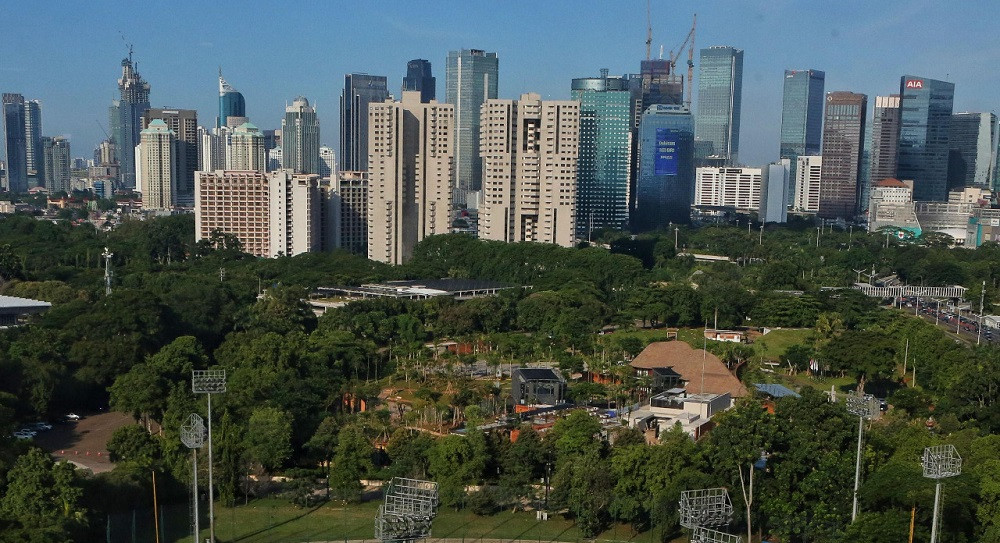Popular Reads
Top Results
Can't find what you're looking for?
View all search resultsPopular Reads
Top Results
Can't find what you're looking for?
View all search resultsSustainability and democracy come under threat
Guterres is not the only one raising the alarm about the future of democracy and human rights, with democracy-focused organizations all around the world expressing equal concern.
Change text size
Gift Premium Articles
to Anyone
O
n Sept. 24, the United Nations secretary-general, António Guterres, convened the Climate Ambition Roundtable to reinforce the critical message that addressing climate change remains a top priority and should not be neglected on the pretext of fighting the COVID-19 pandemic.
Meanwhile, the International Day of Democracy was celebrated on Sept. 15 amid gloomy assessments about the current state of democracy around the world, including in Indonesia, a country many had considered to be a rising star.
Guterres has expressed concern about both the fight against climate change and the preservation of democracy. He has declared on multiple occasions that humanity is losing the battle against climate change and also emphasized in a policy paper titled “COVID-19 and Human Rights, We are all in this together” published in April, the risks that the pandemic poses for eroding democratic principles like freedom of expression and freedom of assembly around the world.
Guterres is not the only one raising the alarm about the future of democracy and human rights, with democracy-focused organizations all around the world expressing equal concern.
For example, even before the pandemic, International IDEA, a global organization that promotes democracy, alerted us to this worrying trend in its report Global State of Democracy 2019: Addressing the Ills, Reviving the Promise.
The report highlights that “the practice of existing democracies has disappointed and disillusioned many citizens and democracy advocates” with many democracies, older and younger alike, facing new challenges.
Now back to climate change. On the positive side of the news, both China and South Korea have just made important announcements regarding their commitments to reducing their greenhouse gas emissions, with the former pledging to become carbon neutral by 2060 and the latter declaring a climate emergency and as consequence, pledging to achieve a net zero target by 2050. On the other hand, Indonesia, which has seen its economy take a severe beating from the pandemic, declared early this year that it would not scale up its ambitions and revise its emissions target beyond its Paris agreement pledge of 29 percent below a business-as-usual projection by 2030. At the same time, concerns are growing over the country’s increasingly fragile democratic “ecosystem” as a consequence of elites “hegemonizing” the political space.
In the field of climate change, the position taken by the government follows the “commonsense” approach that only the most advanced economies can truly afford to have high ambitions to transform their economies through a green revolution.
Yet, while the government works to get the economy back on track, it must not come at the expense of more lost lives or the push toward a greener and more sustainable economy.
This is where the quest for a more sustainable, greener economy that will improve the quality of life of both rich and poor can be synergized with efforts to reinvigorate the hard-fought democratic gains Indonesia has made over the last few decades.
The common thread that brings the environment and democracy together is called the 2030 Agenda, the global blueprint approved in 2015 that is translated into our daily lives through the Sustainable Development Goals (SDGs), goals that Indonesia, at least on paper, has been particularly good at pursuing.
The country has been a trailblazer in conceptualizing the “localizing” approach to the SDGs, allowing citizens to have a voice and role in dealing with local issues, from rainwater management and sustainable agriculture to sewage system construction and recycling practices to sustainable fishing, just to mention a few issues that if properly addressed, can have a direct impact on the achievements of the goals.
In short, dealing with the SDGs according to this model helps increase civic engagement and the overall participation of the general public in local decision-making.
A few major programs supported by donors like the European Union, the UN Development Program and the Australian government have been trying to put this approach into practice.
These pilot projects are groundbreaking, but they will be judged as effective only if discussions go beyond closed-door policymaking to reach out to local communities and if such participatory practices are sustained once the programs end.
Civic engagement happens only on the ground where policymaking is invested in the power of the people.
As rhetorical as these words might seem, local people are the answer to the increasing trend of democratic erosion, in which a culture of entitlement has paved the way for the formation of political dynasties.
People are also the answer for ensuring a more sustainable future.
They are the ones who face, day in and day out, the consequences of rising sea levels, deforestation and other hazards stemming from climate change and environmental destruction. They need to be empowered for real change to happen.
Nowadays, the UN is also organizing Global Goals Week, a series of initiatives that officially mark the start of the decade of action to achieve the SDGs.
Only a deliberate effort from political leaders in Indonesia can truly help the nation navigate the challenging times of COVID-19 and its devastating health and economic consequences and the rising threats from climate change.
Only the people have the power to ensure the post-pandemic future is one that thrives on the changes brought by a new green revolution.
A better democratic system should not just be aimed at improving electoral practices, but also at encouraging people to speak up and fulfill their agency for the sake of a better tomorrow.
***
Cofounder of ENGAGE, a not-for-profit organization promoting social inclusion in Nepal, and writer on social inclusion, youth development, regional integration and the SDGs in the context of the Asia Pacific










